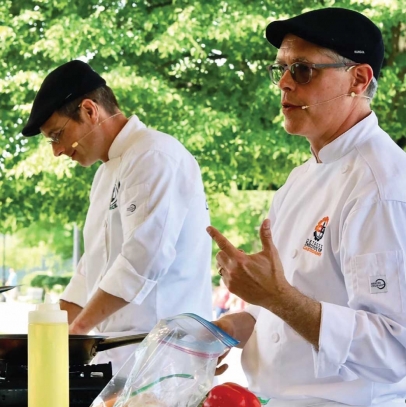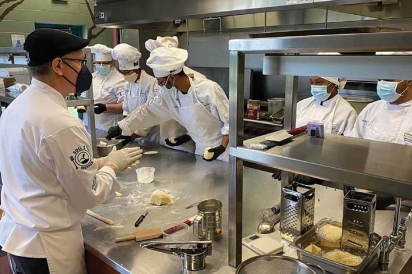Checking in with Soil2Service, edibleWOW's Parent Nonprofit
For Jeremy Abbey and John Piazza, the future is bright and the present action-packed.
TO SAY THAT John Piazza and Jeremy Abbey, founders and executive directors of Soil2Service and publishers of edibleWOW, are passionate about food education is to massively understate.
“Education is the driving force at the center of everything we do,” says Piazza, drawing attention to the Soil2Service graphic as a pictorial of their mission. “You’ve got the growers at one end, because it’s not just the food, it’s the soil where it comes from. On the other end are the sellers and the buyers, the people who are going to enjoy what was produced.”
Smack dab in the middle of the graphic stands a school.
The two food industry veterans and professional chefs met when Piazza hired Abbey to be an instructor at the school where he taught. They clicked instantly.
“We both love food and the industry, and together we realized that we wanted to educate culinarians,” says Piazza, adding that both wondered: “What was the best way to teach in the real world?”
Both also believe in the power of apprenticeship programs. So in 2019 the two launched the Detroit Institute of Gastronomy (DIG), a licensed postsecondary school under the Soil2Service nonprofit umbrella, to provide on-the-job culinary learning right up through sous chef—but on an accelerated two-year track, rather than what is typically a five-year process.
“We first created the online apprenticeship program with the hopes, in the future, to be able to open a restaurant,” says Piazza. Inadvertently, their timing was impeccable. “We were prepared for the pandemic because we were already an online apprentice program.”
Most traditional culinary schools are brick-and-mortar, come-to-class, says Piazza. Some didn’t pivot during the pandemic, while others worked to bring people back as quickly as they could.
“We didn’t have to do that,” Piazza says. “Now we are a full one-year culinary program and two-year sous chef apprentice program registered with the U.S. Department of Labor, so we can provide all of their education to receive the Department of Labor certificate upon graduating. That’s a pretty high honor because I don’t know if there is another apprentice program that has a national registry.”
Students learn techniques, skills, how to run and clean equipment and fundamental cooking processes virtually. At the same time, they apprentice with approved mentors to receive the on-the- job experience that can only be gained working in a busy kitchen. Each site must have an at least 80% from-scratch menu to accommodate the more than 400 skills students must be able to accomplish.
“We’re always looking for places run by chefs, trained professionals, who can guide and provide support for that student,” says Piazza, explaining that what students aren’t able to learn at a traditional culinary school is how to work in a professional kitchen, especially teamwork and a sense of the workload. “They don’t have knowledge of working in a kitchen. They have theory. We teach theory while providing a guided experience on the job.”
After two years and 4,000 hours of on-the-job education, students know what the job is about and have earned that depth of knowledge to help them succeed, Piazza adds. Registered through the Department of Labor, DIG is working diligently to take the next step to be accredited, so that students can access federal aid, helping DIG reach students with financial constraints.
Since its inception, Soil2Service also stepped up to work with other nonprofit organizations, such as The Greening of Detroit, to assist in their Sip and Stroll benefit, and Creating Opportunities to Succeed (COTS).
“We’re proud that we have supported and collaborated with partners who are mutually invested in providing learning opportunities,” says Abbey, including the Oakland County Farmers Market, Gleaners and The Henry Ford. “We want to support other nonprofits, other businesses that need to grow and that exist to help the community.”
The team acquired edibleWOW in 2020 with that in mind, and is working to continue its tradition of celebrating local food and drink heroes and artisans, with an eye on expanding its regional coverage.
Outside the professional food world, community outreach and education for non-chefs are going strong. In fact, food assistance programs that rose up in response to the pandemic created a teaching opportunity.
“Sometimes, background can put you at odds with half the fresh vegetables in the donation box,” says Abbey. “We wanted to help people know not just what they could cook, but also introduce them to the farmer who can tell you how it grows.”
They found an ideal educational partnership with COTS.
“Soil2Service is a collaborative partner,” says Cheryl P. Johnson, the organization’s CEO. “They’ve provided not only nutritional lessons around cooking, food prep and shopping for our families—they’ve created lifelong lessons that will span generations to come.”
Soil2Service also partnered with Make Food Not Waste to create a course that introduces students to the tools and tricks of eliminating food waste in the home. The course shows how to decrease food waste, which in turn helps the planet by decreasing landfill use and greenhouse gas, and also saves families money.
As native Michiganders, both chefs love being able to “showcase and share the quality of people in southeast Michigan,” says Piazza, and “to help farmers and small producers to get great food to people who want and need it,” says Abbey.
“People are working to preserve their heritage, and we’re constantly discovering so many pockets of good food and good people.”
To learn more, or to donate, go to soil2service.org and detroitgastronomy.org.






